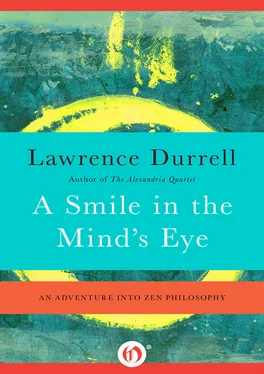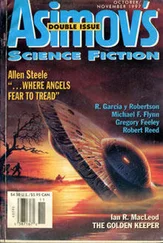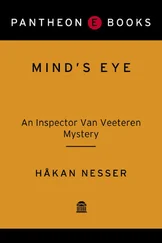A mark, too, of our developing intimacy which had grown out of the idea emanating from his text was his sudden explanation of what he was doing in Sweden. The girl he loved, and by whom he had had a child, was a native of Stockholm and had decided to return there from the States. Chang, who had become very well known in Canada as a photographer who specialized in child portraiture, had found life increasingly void in the New World and had decided to follow her. He showed me some delightful pictures of the little girl — she was as pretty as a cherry-tree in blossom. Having daughters myself I understood his decision perfectly.
We spoke too of mandalas and the range of the symbolic logic contained in this sort of blueprint, as well as in the pure and unalembicated poetry of all classical forms. (Modern poetry and logic seemed to us suspect, though I tried to convince him that in apparently negative works or thoughts there was also a fruitful disgust engendered by the non-participation, as in the plays of Ionesco and Beckett). Or was their non-participation, their refusal to join the dance, their fashionable scepticism, a mark of the intellectual poltroonery which characterizes the age? I wondered. I was at any rate grateful to see Chang’s little Chinese ladies taken seriously somewhere and not relegated to the status of mere point-events rather than souls. I was happy, too, in a way that only an old man can be, that I had lived through a period when woman was not a mere happening but a wholesale Event. When She came into a room we all sprang to our feet to find her a chair; we sat down and waited for her to speak. And when she left we all bounded to open the door for her. And when it closed behind her we all sighed in unison and gazed at one another, exclaiming ‘By Jove! What?’ and fingering out beards and moustaches. Her value to us was far greater than that of a machine à plaisir in the conventional seaside picture-postcard sense. Nor was she just an earth-Mama — for in those days fathers existed, had duties, were accorded a role to play. They were not the burnt-out cases one sees today, incapable of engendering the sexual magnetism which might justify their social role, or of providing a fertile field where a woman could deploy the grand powers of her warmth, her cherish, and the profound intuition which makes her such an incomparable tutor and uncanny guide for a man. When the knack is lost, of course, the children pay the price in psychic deprivation. This too was what the Tao was all about, for the couple and its rapport constituted the basic biological brick out of which society was constructed. If the brick lacks straw … the whole sexual methodology of the cosmos was faulted. When the couple didn’t work, nothing worked.
Walking about among the sunny vines we also spoke about the Ox-Herding pictures and their symbolism of the soul condensing its apprehensions, turning off the cinema in the head, capturing the herd. For me, however, I preferred the imagery from another context — I think Arabic — of the religious instinct like a caged bird which one day escapes into the room. Thenceforward the problem is how to get it back into the cage again. The bird, of course, is intoxicated by this new-found freedom, yet it has no inkling that there is more empty space outside the room, outside the house, outside the solar system. It does not know the meaning of pure space, only a conditional space, as well as a certain longing for the security and certainty of the cage from which it has escaped. But most of these excursions into the outer reaches of philosophy were of no use to the present manuscript which he preferred to keep quite simple, as a monograph, without didactic or ethical overtones. As for the Tao and the whole complex of Chinese thought: it was I who was to benefit by leading him far afield in the moments when we broke off to eat, sleep, discuss, walk. It was enriching for me to discuss these old life-shaping passions like Lao Tsu and Chuang Tzu with someone who had fully grasped the original.
In a general sense too I had repaid my debt to him precisely because in talking round and round the whole subject as we had done I had illuminated for him many areas of our Occidental thought which needed his consideration if he was to make his subject matter clear and penetrating to his western reader. I tested the text, in some aspects somewhat sketchy, against every kind of objection, and he was glad that I had not found it wanting. Time, too, was running out and he was expected at Cambridge, where he would be put up by a friend under rather Spartan conditions, which sometimes resulted in his having to sleep on the floor! But he looked after his clothes and his general tenue as punctiliously as a cat. Despite all offers of the maid to wash his clothes or iron them he preferred to tend them himself, passing a wet cloth over them, or a warm iron. When I thought of the simple way he travelled, sleeping sitting up in trains, and so on, I was struck by how spruce he managed to keep himself. I of course regretted his going so soon. His book had formed a sort of bond between me and my own youthful preoccupations which had all got themselves crystallized round the notion of Tao. It led me back like a plumbline to that remote and far off day by the blue Ionian Sea when I said to myself with astonishment, ‘Why goodness me, I must be a Taoist !’ It explained also the nagging sense of disjunction I had always felt in the West, the sense of being a savage; and also the guilt of feeling that I was playing a part and was unequal to my responsibilities as a Christian believer, and I longed to conform since I loved my mother and father. Yet the awakening, pour ainsi dire, was not just of a poetic order — though if I call it ‘religious’ I mean it rather in the anthropological sense and not in the denominational. After I awoke into poetry I had the feeling that from thenceforward I could do nothing that was wholly frivolous, everything made sense; even if I were to commit evil it would still be purposeful … Then there came another thought which was equally gratuitous, arriving from nowhere. ‘The poet is one whom death cannot surprise, for he has taken up an imaginative emplacement within it by his poems.’ A kid, I had fallen into milk with a vengeance!
‘Have you any food you don’t want?’ The question brought me back to myself. ‘Because I could take it with me. I eat very lightly when I am travelling.’ Together we examined the fridge. He took a lascivious sip of milk to see if it had turned or not. No! Could he take it with him? He reverently poured it into his little hot-water bottle. There were a couple of apples, a small fragment of cheese and a couple of biscuits and a tomato. I calculated that it would just about have kept a mouse alive for a night or so. ‘This will last me three days at least,’ said Chang running his eye over the assembled items. I pictured him in the wastes of Cambridge nibbling at this fare and blowing on his fingers for warmth; but like all good yoga men he hardly felt the cold. ‘I shall be all right.’ I had intended to take him to a station myself but at the last moment I had a notification for a long-distance telephone call which I could not countermand. So I called the village taxi which came scratching and scrawling into the drive on all the loose gravel. ‘Well,’ he said, giving me the benefit of a final Taoist look accompanied by a smile of friendly complicity. ‘Thank you for the whole trip. It’s been a memorable meeting, no?’ Indeed it had, and I felt so despondent at the sight of him leaving that I quite forgot to give him a farewell Chortle. He strung his belongings around him and donned his light overcoat and the ski bonnet of soft wool. ‘We’ll meet again in London,’ he said, and I agreed. Then the taxi bore him off into the night while I stood in the garden for a while, thinking of his book and listening to the whistle of the owls as they came whirring down in search of field-mice or bats.
Читать дальше











